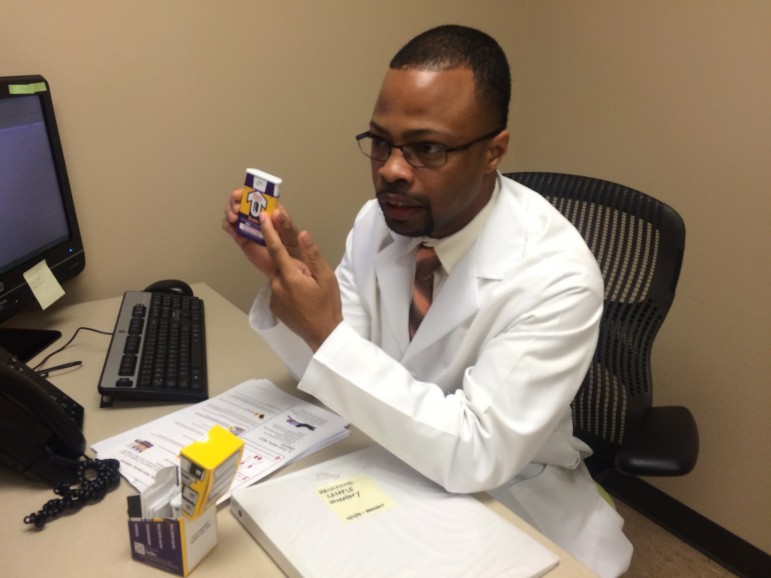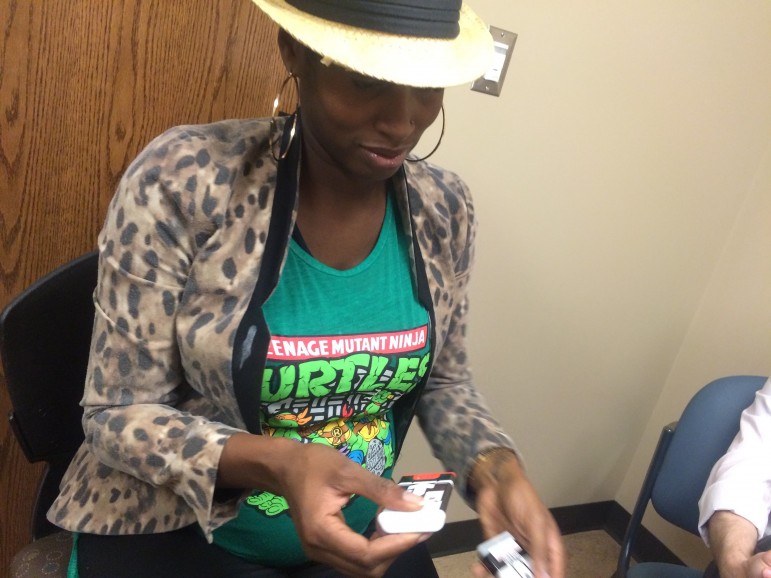Naloxone Helps Stop Heroin Overdoses in Alabama, But Still Not Widely Used
In Jefferson County, heroin abuse rose dramatically in 2014. The county coroner attributed more than 140 deaths to heroin. Law enforcement and the state have been rushing to respond. Last year, the state legislature approved access to a heroin antidote: naloxone, more commonly known as narcan. If used properly, naloxone can reverse the effects of a heroin overdose. Public health officials in Alabama are trying raise awareness and get the potentially life-saving drug to the people who need it most.
More Drugs, More Overdoses
Rev. Matt Lacey is Senior Pastor at Church of the Reconciler, a United Methodist Church on the west side of downtown Birmingham that provides outreach to the homeless.
“Essentially our mission is to walk with folks who are on the street. Be with them on that really long journey from being on the street and into housing,” says Lacey. “We do everything from food to medical care, to everything in between.” That includes drug counseling. Lacey says he’s seen a rise in heroin abuse among the homeless population they serve.
“Heroin has become much so cheaper than prescription drugs. It seems to be the drug of choice for a lot of people on the streets rather than pills,” says Lacey.
“We deal with a lot of drug use and drug abuse,” says Kay Simmons, who also works with Lacey at Church of the Reconciler. She’s says their ministry has had to adapt. “We have had instances where people have overdosed. We had no other option but to call 911,” she says.
But Lacey and Simmons wanted to be better prepared, so on a recent Monday they visited the Jefferson County Department of Health to train on how to use naloxone to reverse a heroin overdose. In 2015, the Alabama Legislature approved a law allowing doctors and dentists to prescribe naloxone to people struggling with heroin abuse or to a friend or family member of a user.
Training To Use Naloxone
Dr. David Hicks, Medical Director for Adult Health and Family Planning, leads the training at the Jefferson County Department of Health. Rev. Lacey and Simmons sit in his small office as he spreads out pamphlets and naloxone injectors on his desk. The Jefferson County Department of Health has run this weekly clinic since November. Hicks says they’ve trained several dozen religious leaders, university staff and people close to heroin addicts to use naloxone. Participants leave with a prescription for naloxone and an injector. He asks Lacey and Simmons a few questions.
“Why do you feel that this is needed?” asks Dr. Hicks, filling out a form on his computer.
“We see a lot in the homeless community,” responds Lacey. “In fact, a couple weeks ago we had an overdose in our restrooms. So we want to have this on hand in case that ever happens again.”
Dr. Hicks opens a box containing one naloxone injector and one empty injector. He hands this “trainer” to Lacey. It looks like an EpiPen, the device people use to stop allergic reactions.
“This is going to teach you to give the injection,” says Dr. Hicks. “There’s no needle in here. You’re going to do it to yourself right now,” he says. Lacey and Simmons both laugh nervously.
Lacey goes first. The trainer’s robotic voice guides him through the process. He stabs the naloxone trainer into his thigh and holds for five seconds as the trainer counts, “1, 2, 3…”
Kay Simmons goes next. She says it’s surprisingly easy. “I would feel comfortable just doing it,” says Simmons. “It’s not messy and I’m not actually having to inject the needle in.” Simmons also says it’s empowering.
“The feeling that we have sometimes when we can’t help people in these types of situations can be overwhelming. So it’s exciting for me to have this product,” says Simmons. “Yeah,” responds Lacey. “I mean, hopefully we won’t have to use it.”
Lacey and Simmons say they’ll go back to Church of the Reconciler and train the rest of the staff on how to use the naloxone injectors. But Hicks and other Jefferson County health officials say not a lot of people are using naloxone or even know that you can get a prescription for naloxone in Alabama. They’re starting an aggressive media campaign next month. The goal is to get the drug to as many people who need it as possible.
US military used laser to take down Border Protection drone, lawmakers say
The U.S. military used a laser to shoot down a Customs and Border Protection drone, members of Congress said Thursday, and the Federal Aviation Administration responded by closing more airspace near El Paso, Texas.
Deadline looms as Anthropic rejects Pentagon demands it remove AI safeguards
The Defense Department has been feuding with Anthropic over military uses of its artificial intelligence tools. At stake are hundreds of millions of dollars in contracts and access to some of the most advanced AI on the planet.
Pakistan’s defense minister says that there is now ‘open war’ with Afghanistan after latest strikes
Pakistan's defense minister said that his country ran out of "patience" and considers that there is now an "open war" with Afghanistan, after both countries launched strikes following an Afghan cross-border attack.
Hillary Clinton calls House Oversight questioning ‘repetitive’ in 6 hour deposition
In more than seven hours behind closed doors, former Secretary of State Hillary Clinton answered questions from the House Oversight Committee as it investigates Jeffrey Epstein.
Chicagoans pay respects to Jesse Jackson as cross-country memorial services begin
Memorial services for the Rev. Jesse Jackson Sr. to honor his long civil rights legacy begin in Chicago. Events will also take place in Washington, D.C., and South Carolina, where he was born and began his activism.
In reversal, Warner Bros. jilts Netflix for Paramount
Warner Bros. says Paramount's sweetened bid to buy the whole company is "superior" to an $83 billion deal it struck with Netflix for just its streaming services, studios, and intellectual property.








